Protom
Via Vic. S. Maria del Pianto, Centro Polifunzionale - Edificio 6
80143 Napoli
Italy

Via Vic. S. Maria del Pianto, Centro Polifunzionale - Edificio 6
80143 Napoli
Italy
RUA PEDRO NUNES, INSTITUTO PEDRO NUNES
3030-199 Coimbra
Portugal

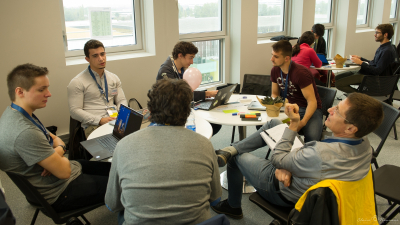
ActInSpace first took place in 2014 and is now an international event that takes place every two years. Its aim is to encourage participants to imagine and design the products and services of tomorrow using satellite data or space applications. This year it is being held in 76 cities worldwide.
Teams of two to five passionate people, such as students, engineers and business people, are given 24 hours to solve challenges proposed by the French space agency CNES, ESA and sponsors including Airbus, SES, Novespace and WEkEO. The challenges are related to space, plus areas such as new technologies and the environment, and are based on using patents or data provided by the sponsors.
This year the hackathon will take place on 13-14 November in either a physical, virtual or hybrid format, depending on the location, having been delayed due to the COVID-19 pandemic. The winners in each country will be invited to the final, which will take place at the beginning of 2021 in Toulouse, France; a city famous in the aerospace world. Amazing prizes have been put up by the sponsors, including a Zero-G Airbus A310 parabolic flight!
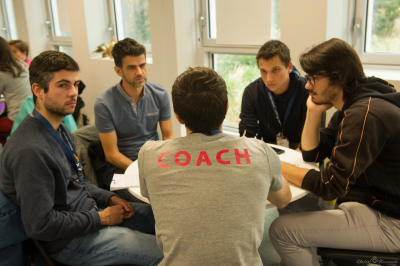
ActInSpace was founded by CNES because it had a lot of patents that were no longer being used. To prevent them going to waste, CNES decided to make them available to others to see if they could use them to create solutions for everyday problems, including those not related to space issues.
CNES was then joined by Airbus, which added its own patents, so as ESA, who also functions as a co-organizer.
ActInSpace provides an opportunity to be part of something bigger than ourselves, to solve real-world problems and even to create new companies. The event, which is midway between a hackathon and a start-up weekend, has been the catalyst for the formation of 35 start-ups through its three events during the past 6 years.
Experts from around the world will be available to help contestants with any technical problems or questions they may have. Although each participant will experience the event separately, it has been designed so that they will all be part of one ActInSpace community.
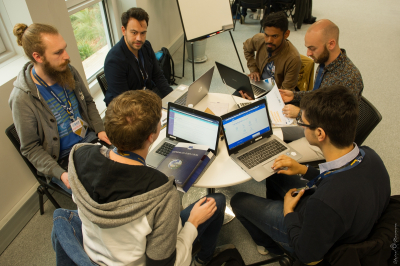
In 2018, ActInSpace had 2,200 participants in 54 cities in 32 countries supported by 500
professionals. Over 500 projects were showcased and 80 challenges were taken up. Find out more about ActInSpace and register at www.actinspace.org
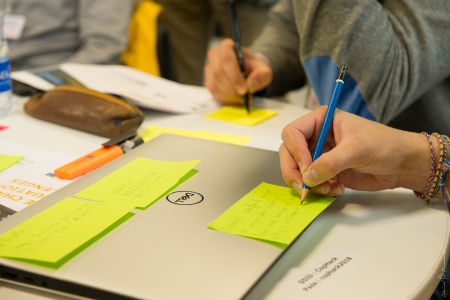
The European Space Agency (ESA) provides Europe’s gateway to space. Learn more about ESA at www.esa.int
ESA Space Solutions is the go-to-place for great business ideas involving space in all areas of society and economy. Our mission is to support entrepreneurs in Europe in the development of business using satellite applications and space technology to improve everyday life. Our programme is designed to provide multiple entry points such as ESA Business Incubation Centres (ESA BICs), ESA Technology Broker Network, and ESA Business Applications programme. Funding typically ranges from 50KEuro to 2MEuro and supports everything from space technology transfer, early stage incubation programs, Feasibility Studies to large-scale Demonstration Projects.
October, 26 / 2020
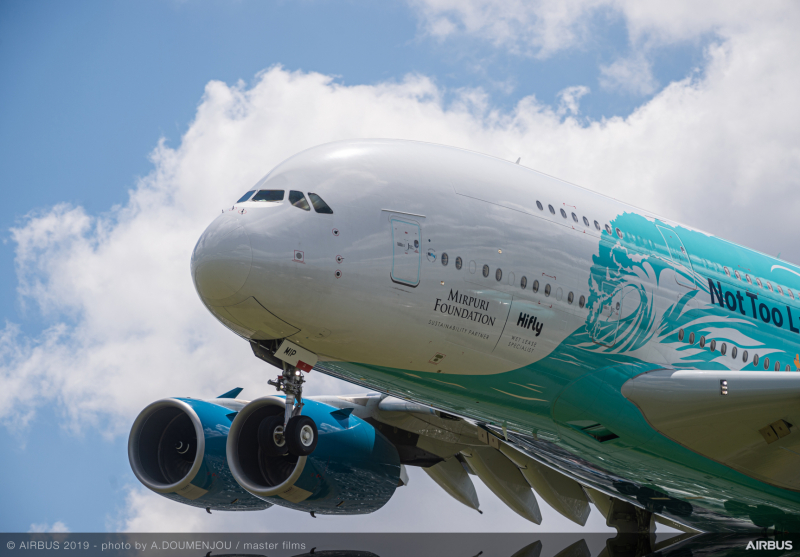
The cooperation started with the Mirpuri Foundation sharing environmental inputs for a feasibility study to support post COVID-19 outbreak socio-economic recovery. The objective of this feasibility study is to identify and analyse the technical feasibility and economic viability of sustainable space-based services which can contribute to the post Covid-19 outbreak recovery in the vertical sectors as transport, health, education, manufacturing, agriculture. Additionally, the study will address societal and environmental challenges likely to emerge after the COVID-19 crisis.
Recently, the Mirpuri Foundation has also supported a new ESA initiative aimed at reducing the environmental impact of plastics, which will assess the viability of space based applications in support of reducing environmental impact of plastics/marine litter, and define a roadmap for services implementation and demonstration.
Paulo Mirpuri, President of the Mirpuri Foundation, described this partnership as “the best way to enable cross-sectoral sustainable innovation, with a prestigious and goal-oriented organization. At the Foundation, we feel very confident that this collaboration will show great results, an advance in technology that will benefit the environment”.
Rita Rinaldo, Head of the Partner-led and Thematic Initiatives for ESA Space Solutions, said: “The cooperation with the Mirpuri Foundation is a unique opportunity to demonstrate how space applications can support a green transition. We are confident that together with the Mirpuri Foundation, we will be able to unlock new opportunities for space and deliver tangible impact at scale."
The Mirpuri Foundation is a non-profit organization based in Portugal, and founded by entrepreneur Paulo Mirpuri with the aim of contributing to a better world for future generations. With its belief that leading by example is the best way to change mindsets, the Mirpuri Foundation fosters cooperation between legislators, corporations, communities and individuals. The Mirpuri Foundation acts in six distinct areas: Marine Conservation, Wildlife Conservation, the Performing Arts, Social Responsibility, Medical Research, and Aviation. The foundation’s commitment to sustainability is transversal and is reflected in all its activities. The Mirpuri Foundation is synonymous with technology, research, information and innovation. Allied to these characteristics are the values of integrity, perseverance and altruism in order to better impact the planet.
The European Space Agency is Europe’s gateway to space. Its mission is to shape the development of Europe’s space capability and ensure that investment in space continues to deliver benefits to the citizens of Europe and the world. ESA is an international organization with 22 Member States. By coordinating the financial and intellectual resources of its members, it can undertake programmes and activities far beyond the scope of any single European country.
ESA Space Solutions aims at reaching commercial exploitation of space assets, data and capabilities addressing incubation, proving technical feasibility and business development. This includes the development of operational services for a wide range of users through the combination of different systems, and support in creating viable companies as well as to existing companies

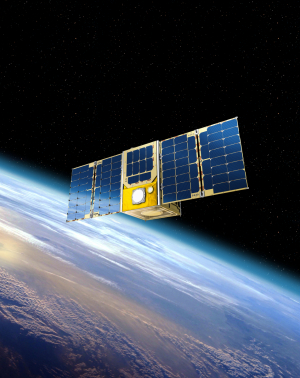
The Anywaves payload user antennas will be used in the initial pair of satellites that Thales Alenia Space has been contracted to build for Omnispace. They will be integrated in a NanoAvionics platform and delivered by the middle of 2021.
Thales selected Anywaves due to its experience in deploying commercial antennas and its expertise in payload antenna design. The small form factor S-band antennas will be customised to support Omnispace’s IoT communications requirements.
The contract from Thales marks a significant stage in the history of Anywaves, which started in 2014 when Nicolas Capet, an antenna engineer for CNES, travelled to Limoges, France, to visit XLIM (a joint research unit of the University of Limoges and CNRS, the French National Centre for Scientific Research) and 3DCeram, later to become a key Anywaves’ collaborator. Capet, an expert in electromagnetism and microwaves, immediately identified the potential benefits of ceramic 3D printing for aerospace.
“At first sight, it might seem there is a huge gap between ceramics, traditionally used in making crockery, and all the high-end technologies associated with spacecraft. But when you stop to think about it, ceramics is known for durability and high heat-resistant properties, so is actually a very interesting material to work with for the space industry,” explains Capet, Anywaves Founder and CEO.
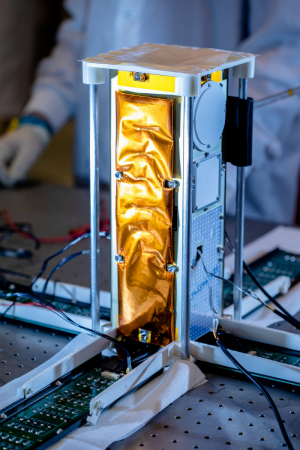
“If you then consider 3D printing, it has the capability to produce specialised and customised versions of almost everything. It is also known for having a lower rate of failure and a lower cost of manufacturing.”
The Anywaves technical concept and business was officially launched in April 2017, after which incubation was an important step for the development of the French start-up. Anywaves was initially incubated at the ESA Business Incubation Centre (ESA BIC) South France, from July 2017 to May 2018. While there, Anywaves won its first contract for the ESA Innovation Triangle Initiative (ITI-139 project for 3D printed substrate tests and qualification) and sold its first antenna: an S-band model for EyeSat.
Anywaves was then incubated at Ecole Nationale do l’Aviation Civile (ENAC) from June 2018 for 16 months, where the team collaborated intensively with the Electromagnetism & Navigation R&D department. It has since become a founding member of the Newspace Factory and five of its antennas have been put into orbit with EyeSat and Angels smallsats.
“ESA BIC Sud France is very happy to have supported Nicolas Capet during the first steps of his company’s birth,” says Aurelie Baker, ESA BIC South France manager. “It is a perfect example of a technology and knowledge transfer from a space agency to an external company for the benefit and development of the new industry of nanosatellites. Anywaves is relying not only on an innovative technology, but also on a highly qualified team. It is a growing company and we bet it's not over yet.” Anywaves’ novel 3D ceramic antennas have garnered many awards. In 2019, it won the I-LAB competition and the Euroconsult FinSpace Satcom & Connectivity Category award during World Satellite Business Week. Then in 2020, recognition came from the Occitanie Region, which hosts the European Space Capital, for Anywaves with the prize for Start-up of the Year.
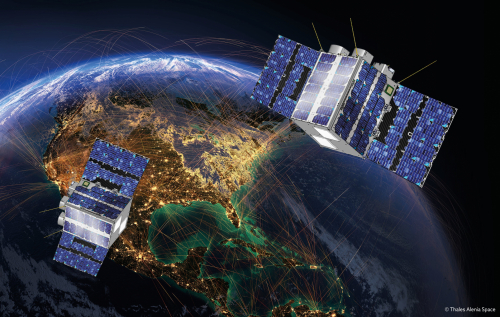
From a well-spotted opportunity back in 2014, Anywaves has grown from one person in 2017 to 20 in 2020 and sold more than 30 antennas. The new contract with Thales for Omnispace marks yet another success for this ambitious company. Julie Ruhlmann, Omnispace Programme Manager at Thales Alenia Space, comments: "Anywaves capacity to design customized antennas perfectly suited to our needs is the reason why we selected them to work alongside with us on this project.”
ESA Space Solutions is the go-to-place for great business ideas involving space in all areas of society and economy. Our mission is to support entrepreneurs in Europe in the development of business using satellite applications and space technology to improve everyday life. Our programme is designed to provide multiple entry points such as ESA Business Incubation Centres (ESA BICs), ESA Technology Broker Network, and ESA Business Applications programme. Funding typically ranges from 50KEuro to 2MEuro and supports everything from space technology transfer, early stage incubation programs, feasibility studies to large-scale demonstration projects.